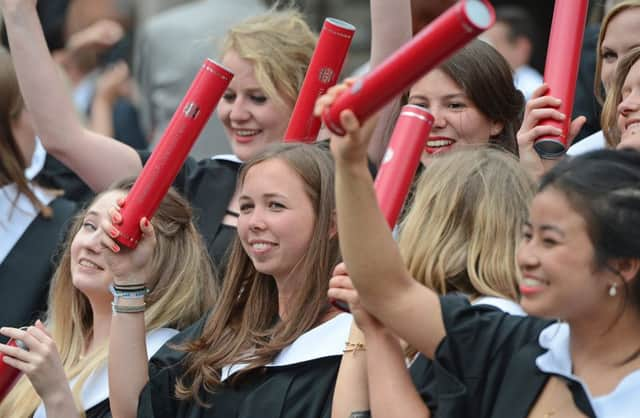Opening the gate to equality in farming


It is human nature to want equality and fairness. I suspect most people reading this believe that everyone who is able to benefit should have equal access to post-school education, regardless of disability, ethnicity, gender, family or domestic background or post-code.
The Scottish Government has stated it supports equality of access – earlier this year, education secretary Angela Constance was quoted as saying: “The Scottish Government has been very clear that we want every child, whatever their background, to have an equal chance of benefiting from higher education.”
Advertisement
Hide AdAdvertisement
Hide AdTo this end, a Commission for Widening Access, chaired by Dame Ruth Silver, has been set up and has been busily gathering evidence from stakeholders. The Commission was announced by the First Minister in November as part of the Scottish Government’s Programme for Government and has set itself the target of 20 per cent of university entrants coming from the most disadvantaged 20 per cent of society.
But widening access to education is not a new initiative. The Scottish Funding Council (SFC) has been encouraging it for many years. One project in which Scotland’s Rural College (SRUC) is involved concerns the SFC-funded Schools for Higher Education programmes. These projects work with pupils who are at risk of not achieving their full potential or those who are achieving but who don’t recognise their potential for progression to Higher Education in colleges or universities. The projects seek to work with schools that have less than the average of 22 per cent progression to higher education.
So how does Scotland fair now? It probably won’t come as a surprise that there is a significant gender imbalance in a range of subject areas males and females choose to study at both college and university. It is no different at SRUC – our engineering courses are male-dominated and our animal care and veterinary nursing qualifications are most popular with females.
We are actively addressing this imbalance but there is no silver bullet and the industries that will employ our graduates have to help.
There are, however, encouraging signs. In the rural sector, for example, nearly 40 per cent of students studying agriculture or rural business management at SRUC were female. So while there is still work to be done to achieve a gender balance on such courses, it is pleasing that females are enthusiastic about entering land-based industries. As an employerw offering commercial consultancy services across Scotland, we are heartened by the number of females now applying for posts as agricultural consultants. This will provide positive role models for the future, further addressing the imbalance and challenging lingering perceptions.
Rurality is another issue of concern in efforts to widen access. For those based in the central belt considering a degree course it is relatively straightforward to visit four of five colleges or universities before deciding where to study. This is much more of an undertaking for young people based in Portree, Lerwick or Wick.
SRUC reports annually to the Scottish Funding Council on the proportion of students we admit from the poorest postcodes. We contend that rural deprivation is not necessarily defined by financial indicators, although this will certainly contribute. We believe that indicators including transport, accessibility of information technology, whether an area has off-grid energy supplies and the proportion of local single or couple owned and run enterprises could all be relevant, as they contribute to local and regional traditions and aspirations. Potential students in certain areas may find themselves with limited opportunities for extracurricular activities either due to the choices available, their ease of access to them or personal time available when compared to those from other backgrounds. We believe this must be taken into account as part of the admissions process for education courses and we fully support the Funding Council’s commitment to contextual admissions.
Critical to the success of widening participation in higher education is bringing students in at lower levels to enable them to eventually progress. Often there is a family or community tradition of leaving school after fourth or fifth year to return to family enterprises. Opening up the opportunities of post-school education with Access and National Certificate level studies, some delivered as Modern Apprenticeships, will provide academic and vocational qualifications, and allow young people to still contribute to family business whilst progressing their education and future opportunities. Our role is then to enable them to maximise their potential and ensure there is understanding of the meaningful benefits of progressing into further studies at Higher National Certificate or degree level, when appropriate.
Advertisement
Hide AdAdvertisement
Hide AdEquality of access to higher education benefits us all. It brings a richness to our colleges and universities, ensures the imbalances of the past are challenged and not allowed to self perpetuate and, above all, it enables our young people to achieve their potential providing the role models for the next generation.
• Dr Kyrsten Black, assistant principal higher education at Scotland’s Rural College
SEE ALSO